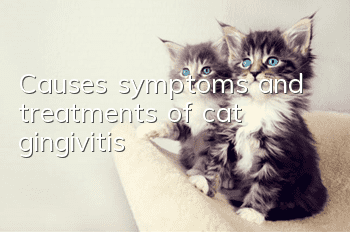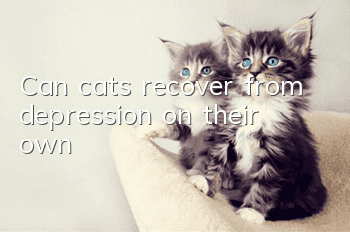Causes, symptoms and treatments of cat gingivitis

Cat gingivitis is a common disease that occurs in cats, and once a cat suffers from the disease, it is rarely cured. So what exactly causes gingivitis in cats?
Unfortunately, human doctors have not yet fully understood the pathology of cat gingivitis, nor have they developed a complete treatment plan. Some cats can relieve their symptoms or even be cured after oral treatment or taking medicine; but some cats will suffer for life. If they unfortunately live in the wild, they will eventually die due to being unable to eat. If they live in a human family, they can still be cared for and strong (and live happily).
The three major causes of disease currently known are as follows:
1) Tartar filled with bacteria causes inflammation.
2) A low immune system is usually caused by infection with other viruses such as feline AIDS (FIV).
3) Other viral infections, such as feline calicivirus (FCV), which are infected through feces and secretions.
What are the current treatments for cat gingivitis?
1. Oral cleaning: Doctors usually clean the cat’s oral cavity to remove tartar. If you want a complete and thorough cleaning, your cat needs to be anesthetized and then have its teeth cleaned. The best thing to do is to apply a long-lasting antibacterial gel after thoroughly cleaning your teeth and gums. During this period, the cat has to bear the risk of anesthesia. Pet hospitals in Taiwan consider teeth cleaning to be a routine solution; domestic animal hospitals or pet clinics are indifferent to this and may not necessarily offer to do it; they can also do it if parents request it. In some cats, oral inflammation can be improved after regular dental cleaning (once a year) and removal of badly decayed cavities.
2. Diagnosis of the cause: After carefully examining the inflammation of the cat’s oral gums, the doctor will remove a portion of the oral tissue for biopsy. This examination can confirm whether the cat is suffering from feline AIDS (which only causes feline AIDS). Are viruses with low immunity (different from AIDS in humans), other viruses or inflammation, contagious? This step is necessary for parents who have multiple cats at home. Some domestic pet clinics can perform this examination, and the cost is not cheap.
3. Medication: Some cats need to take long-term antibiotics, anti-inflammatory drugs, and analgesics to prevent symptoms. Cats that refuse to take medicine must be treated with drug injections.
4. Tooth extraction: When all options fail, the treatment plan in some clinics is to extract all the teeth. This is a very horrifying plan. It is a plan that takes the characteristics of Western medicine to the extreme, such as beheading for headaches and cutting off legs for leg pain. It is also a plan that is adopted only when there is no alternative. Judging from the existing cases, some cats can recover and live unimpeded as a result; however, there are also many case reports on domestic pet forums where the attacks continue after a period of time., in extreme cases the cat eventually drools to death.
5. Care: Groom the cat more often to keep it tidy and clean; give the cat more care so that it can get psychological comfort; provide highly nutritious and crunchy cat food so that it does not have to chew vigorously. It can also be swallowed to maintain nutritional intake.
Preventive measures for cat gingivitis
Prevention seems to be the only controllable solution and the best way to avoid the many troubles we may encounter later. Calyxovirus/calicivirus is considered a factor that may cause oral inflammation, so cats need to receive this vaccine at 6 weeks, 9 weeks, and 12 weeks to prevent infection.
You can regularly buy cat food with tartar removal function for your cat, and use hard friction to remove the cat’s tartar and maintain its oral health (reminder: only for cats who are not sick, otherwise it will make things worse). You can train your cat to accept cat toothpaste, or let it drink cat cleaning drinks directly to keep its mouth clean. Homeopathy, which has become increasingly popular with humans in the UK recently, is also used in pet health care. There is a tablet made from a substance extracted from strawberry plants, which can be added to the cat's food. It is said that one tablet a day can completely remove tartar and calculus, and it can be used regularly for a period of time. In addition, manufacturers also provide capsules like human health supplements, which can be added to food to help with digestion, shiny coat, urinary system, eyesight, etc. In addition, some people have suggested that cats should be allowed to eat raw meat regularly, which not only rubs their teeth, but is also naturally healthy.
- What should I do if my cat’s hair follicles are damaged and no hair grows?
- How long will a Ragdoll cat be in heat?
- How to dry clean cats
- Why do cats still want to go out after being neutered?
- What to do if a kitten has cysts all over its body
- Will a cat still recognize its owner after it is over one year old?
- Can cats eat white fungus?
- Can cats eat fish heads with chopped pepper?
- Can Fold-eared cats eat steak?
- Can kittens eat egg yolk biscuits if they are vomiting?



